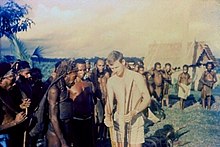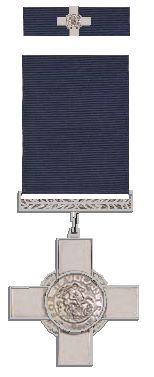Jack Emanuel
Jack Emanuel (in some records spelt Emmanuel) GC (13 December 1918 – 19 August 1971) was an Australian colonial administrator who served as district commissioner in the East New Britain district of Papua New Guinea who was posthumously awarded the George Cross, the highest British (and Commonwealth) award for bravery out of combat, for gallantry displayed between July 1969 and 19 August 1971.
Emanuel was trying to discuss a resolution to a land dispute between European settlers and the Tolai people in August 1971 when he was stabbed to death during negotiations.
[4] After the Second World War ended in 1945, Emanuel applied again for a posting to New Guinea, which soon became a United Nations trust territory of Australia.
[5] Between 1956 and 1965 Emanuel was posted to the Gazelle Peninsula in northeastern East New Britain as assistant district commissioner and became fluent in the language of the local Tolai people.
[2] Some of the Tolai leaders objected to the new councils established by the Australians to administer the territory, viewing them as undermining their authority.
[4] Violence again flared in 1969 when the Australians decided the Gazelle Peninsula council should consist of representatives from other peoples, as well as the Tolai.
[3] In July 1969 Emanuel was appointed acting district commissioner for the East New Britain portion of the recently united Territory of Papua and New Guinea, this was a more senior role but again with a wide range of local government administration responsibilities.
Emanuel, based in Rabaul, was given the particular task to reduce conflict and restore local government in the Gazelle Peninsula.
Under Emanuel, who was regarded as a liberal and well respected commissioner, the Gazelle Peninsula achieved one of the highest literacy rates in the territory.
[10][11][12] On 19 August 1971, Tolai in war paint had assembled at Kabaira plantation on the Gazelle Peninsula and were confronted by the police.
[3] Emanuel's killers, Tolai leader William Taupa and four others, were afterwards arrested and brought to justice following a complex trial reported to have cost around AU$250,000.
[17] The Tolai people were generally shocked by the murder and the incident led to them largely abandoning the land protest movement.

